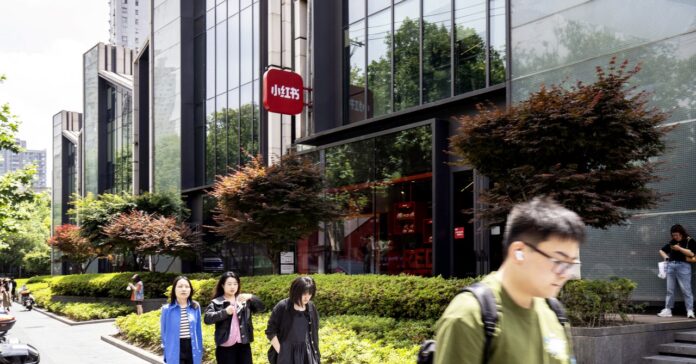The Chinese social media platform Xiaohongshu—better known internationally as RedNote—is scrambling to boost its ability to moderate English-language content after hundreds of thousands of American users suddenly joined the platform in anticipation of TikTok potentially being banned in the United States on Sunday.
WIRED identified a handful of job listings posted to recruitment platforms by tech outsourcing companies in China this week for content moderators who can help manage the unexpected influx of English videos and posts being uploaded to Xiaohongshu. (There were also several new recruitment notices posted looking for content moderators who can work in Chinese, the platform’s default language.)
VXI Global Solutions, an American customer service company that has operated in China since the early 2000s, posted job vacancies on the recruitment websites Zhilian Zhaopin and BOSS Zhipin, specifying that candidates would be “moderating the videos by accounts of foreign friends on Xiaohongshu.” The recruiter even labeled one of the listings “Xiaohongshu overnight urgent recruitment—TikTok refugee moderation, short-term [contracts] accepted.”
Jinhui Rongzhi Technology, an IT service outsourcing company, and Transn, an AI-powered translation service provider, also posted similar recruitment notices this week looking for English-speaking content moderators to work for Xiaohongshu. WIRED contacted the three companies to confirm the validity of the listings. None of them responded in time for publication. Xiaohongshu also did not immediately return a request for comment.
The salary for the jobs range from 4,500 RMB to 8,000 RMB a month (about $600 to $1,100). Applicants are required to demonstrate their English language skills and prove they passed a proficiency exam. One listing noted that the position must be filled within three days, and candidates need not apply if they can’t start immediately.
Liu said it’s nearly impossible for Xiaohongshu to quickly recruit so many moderators who speak English. “Content moderation isn’t something you can just do through translation tools. It’s a very sophisticated job,” that “requires the person to speak the relevant languages.”
Liu reposted a screenshot on Bluesky showing that some people who recently joined Xiaohongshu have received notifications that their posts can only be shown to other users after 48 hours, seemingly giving the company time to determine whether they may be violating any of the platform’s rules. This is a sign that Xiaohongshu’s moderation teams are unable to react swiftly, Liu says.
China Digital Times previously published a 2020 internal instruction manual for Xiaohongshu content moderators that explained how they should respond to “sudden incidents.” Liu notes that Xiaohongshu is not an app commonly used for political discussions, but nevertheless, the manual shows that moderators were told to be prepared for any accidental political content users might share. Regarding the 2019 pro-democracy protests in Hong Kong, the document asks that moderators be careful to ensure that travel photos from the city don’t include landmarks like the Pillar of Shame, which commemorated lives lost in the 1989 Tiananmen Square Massacre, or depict demonstrators on the streets, Liu says.
As in other parts of the world, content moderation is one of the most tedious and low-paying jobs in China’s tech industry. Social media platforms often outsource the role to companies that hire moderators on a contract basis, allowing tech giants to avoid providing the same benefits to these workers as they do to full-time employees.
While the majority of the new TikTok refugees still appear to be enjoying their time on Xiaohongshu, some have already had their posts censored. Christine Lu, a Taiwanese-American tech entrepreneur who created a Xiaohongshu account on Wednesday, says she was suspended after uploading three provocative posts about Tiananmen, Tibet, and Taiwan. “I support more [Chinese and American] people engaging directly. But also, knowing China, I knew it wouldn’t last for long,” Lu tells WIRED.
The fact that Americans are now flocking to a domestic Chinese social media platform that blatantly removes content deemed unacceptable by the Chinese government demonstrates the ineffectiveness of trying to ban a single app like TikTok in the first place, says Funk. “A more sustainable approach to dealing with the potential risks presented by TikTok, RedNote, or any Chinese-owned app is passing legislation that strengthens data privacy and cybersecurity and requires social media platforms to operate with more transparency,” she says.
Source : Wired






